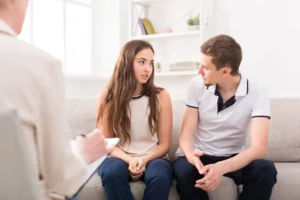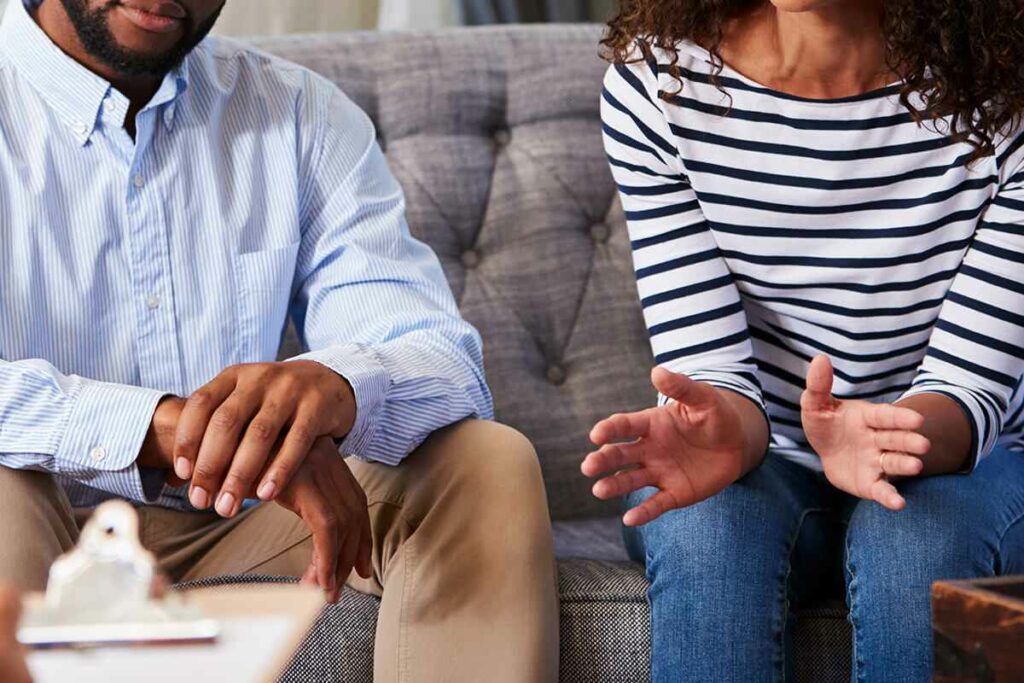Couples therapy isn’t just for married duos or those on the brink of separation. In fact, it can be a powerful tool for any couple looking to strengthen their bond and proactively tackle potential issues before they become major hurdles. This applies to unmarried couples as well. In this blog post, we’ll explore how couples therapy can play a pivotal role in the relationship dynamics of unmarried couples and provide them with valuable strategies to navigate their romantic journey together.
Contents
Is It Healthy To Go To Couples Therapy?
 Absolutely, couples therapy can be an incredibly healthy decision for a relationship, regardless of its current status or longevity. This form of therapy serves as a safe, guided space where both parties can openly express their feelings, perceptions, and expectations. It’s a place to learn more about each other, and to develop the crucial skills of empathy, communication, and problem-solving.
Absolutely, couples therapy can be an incredibly healthy decision for a relationship, regardless of its current status or longevity. This form of therapy serves as a safe, guided space where both parties can openly express their feelings, perceptions, and expectations. It’s a place to learn more about each other, and to develop the crucial skills of empathy, communication, and problem-solving.
Moreover, couples therapy isn’t exclusive to those in a committed or long-term relationship. Unmarried couples, new partners, and even those in non-traditional relationship structures can all find value in the guidance of a professional therapist. The ultimate goal of couples therapy is to enhance understanding, communication, and connection between partners.
In fact, it’s not just healthy but also a wise and mature step to consider couples therapy. It shows an investment in the relationship’s future and a willingness to work on areas of growth and development.
Why Should Unmarried Couples Consider Therapy?
Unmarried couples should consider therapy for a multitude of reasons. Here are a few of the key ones:
- Proactive Problem Solving
Many couples wait until they’re on the brink of a breakup before seeking help. But why wait until there’s a major issue to solve? Early therapy can help address and navigate minor problems before they morph into significant obstacles, potentially preventing breakups or significant relationship strains down the line.
- Deepening Connection
Therapy can help partners understand each other on a deeper level. It can also help unearth the underlying issues or past experiences that might be influencing current behaviors, thus fostering a deeper emotional connection.
For those considering marriage, therapy can serve as a form of pre-marital counseling. It’s a great way to explore compatibility, address potential areas of conflict, and establish shared expectations for the future.
- Transition Management
Unmarried couples often experience transitions such as moving in together, blending families, or managing career changes. Therapy can provide tools and strategies to navigate these transitions smoothly.
- Boosting Intimacy
Intimacy isn’t just about physical connection. Emotional intimacy is equally important, and therapy can help couples enhance both. Ultimately, contributing to a more fulfilling relationship.
- Personal Growth
Therapy doesn’t just promote growth in the relationship; it also encourages personal growth. As individuals understand themselves better through therapy, they’re likely to become better partners as well.
In essence, therapy isn’t a sign of failure or a last resort for unmarried couples. Instead, it’s a healthy choice that signifies commitment, resilience, and the desire for a robust, fulfilling relationship.
Techniques Used In Couples Therapy For Unmarried Couples
 Several therapeutic techniques can be particularly beneficial for unmarried couples in couples therapy. Here are a few common ones:
Several therapeutic techniques can be particularly beneficial for unmarried couples in couples therapy. Here are a few common ones:
- Gottman Method: This technique, based on Dr. John Gottman’s extensive research, focuses on improving a couple’s friendship and conflict management. It involves exercises to increase affection, empathy, and mutual respect, thereby helping couples manage conflicts effectively.
- Emotionally Focused Therapy (EFT): EFT helps couples understand and reorganize their emotional responses to improve their emotional connection. By recognizing patterns of interaction, couples can respond to each other’s needs more effectively.
- Cognitive Behavioral Therapy (CBT): This approach aims to change negative patterns of thinking or behavior. Through CBT, couples can learn to identify and manage harmful thought processes that might be affecting their relationship.
- Narrative Therapy: This method allows couples to view their issues as separate entities rather than inherent parts of their personalities. It can help couples see past dominant narratives in their relationship and rewrite their shared story in a healthier, more positive light.
- Solution-Focused Therapy (SFT): SFT emphasizes finding solutions in the present time and exploring future hopes and goals, rather than focusing on past problems. This can be particularly beneficial for unmarried couples looking to build a future together.
- Imago Relationship Therapy: This approach helps couples understand the unconscious factors (the “Imago”) that drew them together, often based on unmet needs from their childhood. It encourages empathetic listening and understanding, enhancing the emotional connection.
- Communication Exercises: These are practical exercises to improve verbal and non-verbal communication. They may involve speaking and listening techniques, like the “speaker-listener technique,” that promote active listening and respectful expression of opinions.
- Role Playing: This technique allows couples to step into each other’s shoes to better understand their partner’s perspective. It can lead to greater empathy and understanding.
Remember, every couple is unique, so different techniques may be more or less effective depending on the couple’s specific needs and circumstances. A good therapist will adapt their approach based on what will be most beneficial for the couple they’re working with.
How Long Do Most Couples Do Therapy?
The duration of couples therapy can vary significantly depending on the couple and the specific issues they’re addressing. It’s a highly individual process, and different couples will have different needs and progress at different rates.
As a rough estimate, many couples attend weekly sessions for about 12 to 20 weeks. This timeframe allows for the identification of key issues, the development of a plan to address these issues, and the implementation and practice of new strategies or behaviors.
However, some couples may find that they benefit from a longer period of therapy, particularly if they’re dealing with complex or deep-seated issues. They might choose to continue therapy for several months or even years, potentially with less frequent sessions as they progress.
Ultimately, the duration of therapy will be influenced by factors like the couple’s commitment to the process, their willingness to change, the complexity of the issues they’re facing, and the approach and recommendations of the therapist.
Finding The Right Couples Therapist For Unmarried Couples
 Finding the right therapist is crucial for successful couples therapy. The right therapist can help to create a safe, non-judgmental environment where both partners feel comfortable expressing their feelings and working on their relationship. Here are some tips to help unmarried couples find the right therapist:
Finding the right therapist is crucial for successful couples therapy. The right therapist can help to create a safe, non-judgmental environment where both partners feel comfortable expressing their feelings and working on their relationship. Here are some tips to help unmarried couples find the right therapist:
Identify Your Needs
Before starting the search, it’s essential to identify what you hope to achieve from therapy. Are you looking to improve communication, solve specific issues, or find better ways to manage conflicts? Having a clear understanding of your goals can guide you towards a therapist who specializes in these areas.
Research and Referrals
Start by asking for referrals from trusted sources like friends, family, or primary care doctors. You can also use online directories provided by professional organizations like the American Association for Marriage and Family Therapy (AAMFT) or MantraCare. Remember to research potential therapists’ qualifications, areas of expertise, and therapeutic approach.
Specialization
Look for a therapist who specializes in couples therapy, as they’ll have specific training and skills to handle the complexities of relationship dynamics. Additionally, some therapists may specialize in areas relevant to your situation, such as pre-marital counseling, blended families, or LGBTQ+ relationships.
Consultations
Most therapists offer initial consultations. Use this opportunity to ask about their experience, approach, how they handle conflicts, confidentiality rules, and what to expect from therapy. It’s also a chance to see if you feel comfortable with them, which is crucial as therapy involves open communication.
Cost and Logistics
Consider practical factors such as the therapist’s fees, availability, location, and whether they accept your insurance. These factors can significantly influence your therapy experience and commitment.
Trust Your Gut
Ultimately, the “right” therapist is someone you and your partner feel comfortable with. If something doesn’t feel right after a few sessions, don’t be afraid to seek out a different therapist. Therapy is a personal journey, and the therapeutic alliance (the relationship between you and your therapist) is a significant factor in successful therapy.
Remember, finding the right therapist may take some time and possibly even a few tries. But it’s worth the effort. The right therapist can provide the support, guidance, and tools you need to enhance your relationship.
Conclusion
In conclusion, couples therapy is not only for those facing significant issues or on the brink of a breakup. It’s a proactive, beneficial tool that can help unmarried couples navigate their relationship journey together more effectively.
Engaging in couples therapy is a step towards a healthier, more fulfilling relationship. It’s an investment in your shared future, providing tools and strategies to navigate whatever comes your way together.
Addressing and resolving a couple of issues is essential for a strong and lasting partnership. If you have any queries regarding Online Couple Counseling experienced therapists at CoupleMantra can help. Book a trial couple therapy session.


